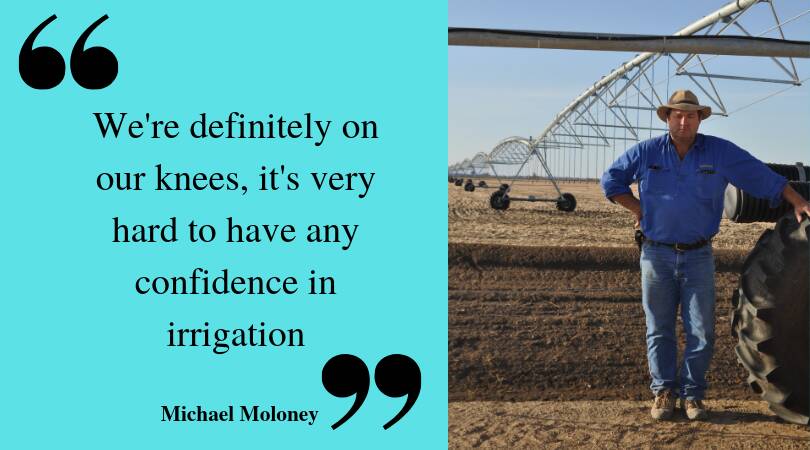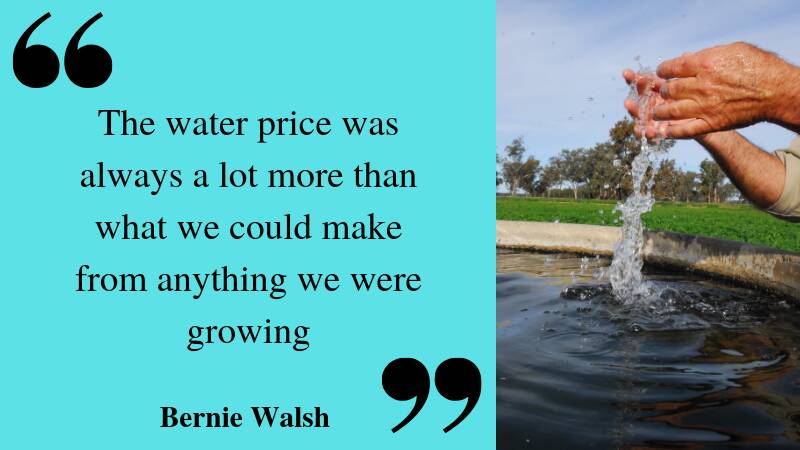
A free-market revolution has swept across the Murray Darling Basin and its communities since economic and environmental reforms kicked off in 1994.
Subscribe now for unlimited access to all our agricultural news
across the nation
or signup to continue reading
According to election-fuelled national media, our biggest worries stop at fish kills, government overspend on water buybacks and the antics of a very angry ex-Water Minister.
But what you won't hear is the human cost of decades of free market reforms. The publication spoke to some farmers on the frontline.
Jerilderie irrigator, Michael Moloney, runs a 4800 hectare operation, half of which is irrigated. He is in the Murray Irrigation area and grows mostly winter crops and some maize.
"We're definitely on our knees, it's very hard to have any confidence in irrigation, we've gone from being irrigators to opportunist irrigators.
The general feeling among irrigators is that we're angry and bitter and it seems like the whole system is simply being drained down to South Australia.
There's just a general lack of confidence. It's (the Basin Plan) taken security away from our business, you know we can't rely on irrigation anymore, you can't plan.
This year we only put in a third of our usual corn area and the whole thing was a low margin, high risk exercise that we wouldn't care to repeat.
We carried over (water) last year and bought some to finish off winter crops, but we've got no fall-back this year.
(Before the water reform) we had vibrant communities, exciting businesses, we were able to forward plan and invest.
The biggest change I've seen in my whole career has been the Basin Plan, it's decimated irrigation. With the river in minor flood for most of the summer and zero allocation, it's been just unbelievable.
What needs to happen is independent, apolitical research into the Murray Darling Basin Plan by someone that's had nothing to do with it before, a fresh water ecologist from overseas or someone like that, because the whole thing is so politically tainted now.
The lower lakes and the Coorong need to be included in the Basin Plan, because they're not at the moment. I would also like to know which politicians own (or have owned) water and when they sold and bought it in every state, and their families."
Third-generation Yanco irrigator, Bernie Walsh, sold his property to walnut growers last year due to the price of water and low allocation.
"(The irrigation industry is) absolutely flawed at the moment, honestly it's a mess, the main reason we got out was because we couldn't see a future in it.
What really struck us is one day we went to a meeting in Griffith that was an explanation from State Water on how they derive our water allocations. We were really interested because we were wondering why on earth are we getting such low allocations.
The explanation was so complicated that (my wife) Elizabeth and I walked away from that meeting understanding little and thinking it was all ridiculous.

We had to make our decisions on their decisions... so we were making decisions based on something we didn't understand.
It just got to the stage that the water price was always a lot more than what we could make from anything we were growing.
It was becoming impossible for us, we had some debt and we just thought this is getting way too hard to keep going.
(To improve efficiency) we put in the raised beds and did a whole farm plan to become more water efficient, but it seemed like the more efficient we became the less and less water we had to work with.
It cost us a heap of money to become more efficient, so we had to have the water to grow the crops to make the money to pay back the loan. It was a vicious cycle.
RELATED READING
You can only become efficient to a point, and now we might have a really good layout, but there's no water left to use it.
All I can see is the price of water going up and up and it's just not economic to grow crops.
I'm still at a loss with their reasoning of letting the water run down the river and flushing it out to sea. I would like to see that scrutinised.
I'm worried they're not enhancing the environment, they actually could be damaging it."
Robert Hoddle, Gunnible Pastoral Company, Gunnedah, runs 30,000 mixed citrus trees.
"I think we have got a terrible shortage of water and unless we get good general rain the prospects for next summer are dire.
We have permanent plantings. We grow 50ha of oranges and we rely on the underground water and we are finding that during the peak in January and February when there is a lot demand on the aquifer what we can pump is restricted.
We have had to put down a new bore and put in a very expensive pipeline to automate our system to enable us to continue to produce a permanent crop.

We had 70pc of our water allocation taken away and then we had to buy water back again and now in our situation if we are buying more water back again, which we will probably have to try and do, we are competing with the mining industry at auction.
My big thing is we have to become more efficient in the way we apply the water. I believe we could probably use half the water we are using, as they have in other countries like Israel.
In our valley we have competition between agriculture, mining and urban, and urban is growing considerably because a number of these quarter acre blocks are all wanting water and we just extended the pipeline from Gunnedah to Curlewis and are pumping out of the same aquifer, which is over pumped anyway.
The only solution is water efficiency to me and that is just so important in our situation. We use drip technology so we really are absolutely as efficient as we can possibly be and its a really good system.
We moved from irrigating pasture and lucerne for cattle into an intensive citrus orchard. We went to something that had a higher return per megalitre.
It seems like the citrus, nuts and horticulture are probably offering better returns than cotton and cereal. The drip system is fantastic. We have had it for 12 years and the efficiency is huge, we get minimal evaporation.
I think we have got to be realistic. If you put water in above ground storage you will lose over half of it in a season through evaporation and that is huge, so if we could do away with that we have saved half the water.
Governments have probably got to focus on helping people transition to better, more efficient watering systems. Everyone is worried about the water. There is not a lot of it."
- If you have a story on how water reform has affected you, your family or your community and you would like to share it with The Land, please email us at: letters@theland.com.au

